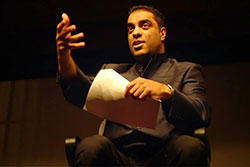To my friends and acquaintances and those along for the ride – welcome to my blog!
I never did consider it of importance, or for that matter of reasonable interest, that people may want to read what’s rushing around in my mind, much less on a monthly basis, but after much cajoling and some provocation – here it is. I hope you will be lenient in your judgments.
How to start? Well, firstly, I admit that a person’s viewpoint, and therefore their labour in a certain area of expertise, is greatly informed by multiple experiences. It would not be conducive for me to write on musical matters alone, nor on some other issue alone, – but rather to see the connective tissue in all of life’s quirky offerings and take freely from all to create the whole. I will try and keep things varied.
I’ve been interested for some time in the ‘goings on’ of the Supreme Court of the United States. I didn’t assume that all legal issues would fascinate – and they really don’t. However, legal opinions – and dissents – as Justice’s try and draw readers to their point of view – are sometimes a fascinating reliquary of language and an equally firm display of communication, successful or not, as the case might be.
It got me thinking about music as a method of communication and its successes and failures in getting its point across. I have conducted some pieces that were hot off the press, literally, and I had the composer present at the first reading with orchestra. It was always the case that a well-constructed passage spoke its message, whilst a lesser construction deviated from message, even if that message was eventually more important to the direction of the piece. Passage of time might change the acceptance of some musical work – like the well written dissent – so long as it is crafted with superior quality. This craftsmanship is key – it’s not everything – but it’s key!!! If there is time,peruse a dissent written by Justice Ginsberg or Justice Scalia, from opposite sides of American jurisprudence – and the craftsmanship will often take one beyond the confines of the opinion – and sometimes beyond the confines of one’s own prejudices.
In literary terms, it is important to communicate effectively, but surely that is not all that is required. There must be some artistry and craftsmanship in the construction of the language as well – whether poetry, essays, musical phrases or legal dissents. If not, then is it enough to have a world where communication is achieved, but with no distinct craftsmanship, grammar, syntax, spelling etc.? I hope not! A recent incident in the United States referred to a professor as racist when he tried to correct basic writing skills in a student’s offered text. If an institution of higher learning cannot insist on high standards for fear of being labeled, then we must all stand guard over the imperiled future of human endeavor.
Communication can be parsed to basic elements of understanding – satisfactory for the ‘get by’ basic instincts in this world. Craftsmanship might unlock the key to deeper understanding – “force your way into secrets” – and stand in a different world altogether. What separates speech from linguistic artistry and sound from music? Why are the impulses different?- Both communicate effectively! I suppose I’ve been considering these questions as part of my ‘ramp up’ to a talk for the Literary Society of Bombay. I have been drawn to the conclusion that those baser instincts separate one field of human endeavor from another. The higher instincts – and therefore the deeper understanding – conjoin them as impulses from the same creative phenomenon. A poet is a composer and an orator is a musician – the glorious impulse being the same. A ‘word talker’ and a ‘sound maker’ are something quite different.
Not only should one see one’s contribution from many different angles but consider one’s contribution in the relevance of a rich surrounding world. Recently, I have found this tack most helpful.
I suppose I’m driving at the core of this quotation from Beethoven:
“Don’t only practice your art, but force your way into its secrets; art deserves that, for it and knowledge can raise man to the Divine.” – Ludwig van Beethoven
Many Thanks!








